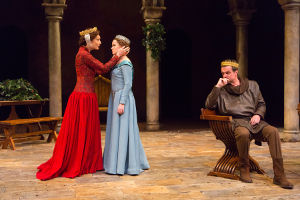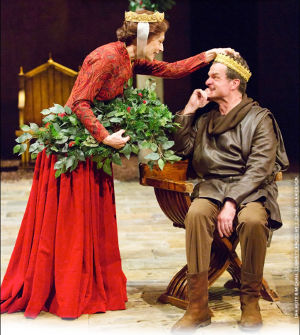|
“The
Lion in Winter” Warms Up Two River Theater
Two River Theater, Bridge Ave., Red Bank
Through Dec. 4 Wed. at 1 & 7PM; Thurs&Fri at 8PM (no show
Thurs Nov 24th – added 3PM matinee on Fri 25th); Sat. 3 &
8PM; Sun 3PM. Tickets ($20-$70): 732-345-1400 or www.tworivertheater.org
Reviewed by Philip Dorian October 22, 2016.
Set over Christmas Eve and Day in the year 1183, “The Lion
in Winter” is based on events in the lives of seven historical
figures: Henry II, King of England, Scotland, Wales, etc.; his Queen-wife-prisoner
Eleanor, late of Aquitaine; their three sons; Henry’s mistress
Alais; and Alais’s brother Philip, King of France. Real people,
yes; but it’s not a history lesson. “The people,”
wrote James Goldman in the preface to his play, “while consistent
with the facts we have, are fictions.” In that context, concocted
as it is out of fact, rumor and inference, “The Lion in Winter”
is a flavorsome entree, served up in a thoroughly engrossing staging
at Two River Theater in Red Bank, NJ.
Written 60 years ago and set eight Centuries earlier, neither its
style nor its setting is stale. Its “anachronisms in speech,
thought, habit, custom and so on…are deliberate” (Goldman
again), and the concept of a family squabbling (or worse) over mulled
wine at Christmas might just as well be 2016 as 800 years ago.
 |
| Queen Eleanor (Dee Hoty) comforts Mistress Alais
(Madeleine Rogers), both in designer Andrea Hood creations, as
Henry ponders the situation. |
At age 50, long-lived for that time, Henry (Michael Cumpsty) is concerned
over the succession to his throne. His anointed first-born having
died, he now wants to designate youngest son John (Noah Averbach-Katz),
despite the 16-year old lad’s overall awkwardness (an understated
assessment). Eleanor (Dee Hoty), released from confinement for the
Holiday (she had plotted against Henry earlier), favors eldest son
Richard (KeiLyn Durrel Jones), which leaves Geoffrey (Hubert Point-Du-Jour)
in limbo. “There’s no affection for me here,” Geoff
laments, in a middle-child whine. (What else is new?)
Toss Henry’s mistress Alais (Madeleine Rogers), who will be
wedded Queen to whichever son (Oh, those Royals!), and her King-of-France
brother (Ronald Peet) into the mix, and the recipe for familial dysfunction
is complete.
No less an authority on acting than Lord Laurence Olivier said “Talent
is plentiful; skill rare.” While we might quibble that first
assertion, the second is a given, and nowhere does it apply more than
in the performances of Michael Cumpsty and Dee Hoty. Throughout, Henry
and Eleanor express anger, distrust, jealousy and even murderous intentions
toward each other – all amid declarations of undying devotion,
including a hinted-at conjugal diversion during Eleanor’s parole.
Cumpsty and Hoty enact all those elements, not just in succession,
but, it seems at times, simultaneously. Acted to perfection, Goldman’s
power-pair are the original Frenemies. And no one betters Cumpsty
at mining the humor in dramatic characters and situations, a skill
much in evidence here.
 |
| King Henry (Michael Cumpsty) to
Queen Eleanor (Dee Hoty): "Well, what should we hange? The
holly or each other?" |
Their triangle is completed by Alais, raised by Eleanor from age seven
and Henry’s lover from sixteen (an R-rated play, this). Now
23, she is both vulnerable and intuitive. Rogers’ sensitive
performance (in an interestingly-written role) is a window into what
it must have been like to be a pawn in a game coldly played by Kings
and Queens.
If the pace falters a bit in scenes where those three are absent,
it is a fault shared by the play and the players. None of the sons
gets much below the surface, but their function is more to serve their
parents’ machinations than to flesh out their own characters,
although they do impress in a late scene in the wine cellar. The French
King, 33 years Henry’s junior at age 17, bristles at Henry’s
repeatedly calling him “boy.” Casting a Black actor adds
an extra measure of tension to those exchanges.
Besides her exemplary staging and some intuitive character etching,
director Tyne Rafaeli’s subtle touches illuminate the piece.
The script calls for Henry to arrange a wisp of Alais’s hair,
for example. “Let’s have one strand askew,” he says.
“Nothing in life has any business being perfect.” Later,
Eleanor, unprompted by the playwright, adjusts the stray wisp back
to its constraint. I’m attributing that telling bit of business
to the director. Maybe not, of course; I’ve been wrong before.
Nothing in life has any business being perfect.
|


